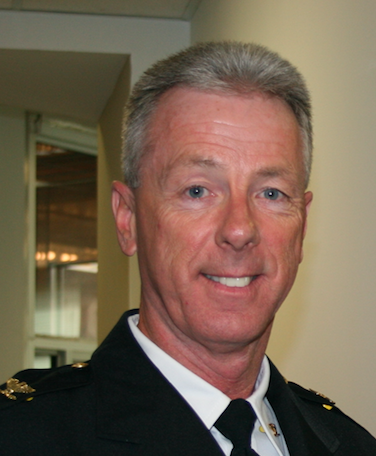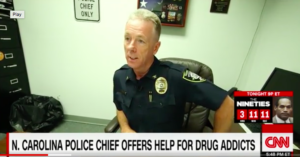Nashville NC Police Department Breaks with Tradition and Provides HOPE to Drug Users
Interview by Melanie Raskin
It’s not your typical law enforcement model, to invite people with opioid addiction to come to the police department, turn in their drugs and get treatment help, with no judgment, no arrest and no jail. But it’s working in Nashville, NC. Based on the Gloucester, Massachusetts, Angel program, and a first in North Carolina, Nashville’s HOPE Initiative sees substance abuse disorder as an illness–not a moral failing–and is working to reduce the stigma and get people into long-term sustained recovery so they can become productive again.
Nashville, N.C., police chief Thomas Bashore earned a Dogwood Award for 2017 from the N.C. Department of Justice for his work in starting the town’s HOPE Initiative, reducing crime, and helping heroin and opioid addicts
What is the problem the HOPE Initiative is solving?
We think there are three problems. One, we are trying to reduce the stigma associated with substance abuse disorder. Two, for the folks who need help but don’t know where to turn, we are getting them into the system and pointing them in the direction of treatment.
When we first started this, I had no idea what I was getting myself into. There were some assumptions on my part that just weren’t true. I thought everyone who walked in our door would have health insurance and they would come  in and say, “OK, send me wherever for however long and fix me.” I soon realized neither were true. We found 95 percent of the people who came through our door did not have insurance and were frustrated because when they called facilities looking for help, they were told they needed $10,000 to $20,000 for treatment. They would hang up, thinking they were condemned to this life forever. That’s number three, we’re giving people hope.
in and say, “OK, send me wherever for however long and fix me.” I soon realized neither were true. We found 95 percent of the people who came through our door did not have insurance and were frustrated because when they called facilities looking for help, they were told they needed $10,000 to $20,000 for treatment. They would hang up, thinking they were condemned to this life forever. That’s number three, we’re giving people hope.
Why did a crime-stopping organization decide to start “forgiving” crime?
Traditional law enforcement’s role in the drug problem is to arrest and jail. Now, we’re looking at this differently. We see substance abuse disorder as an illness, and not a moral failing. The Surgeon General has called it a brain disease for decades. This is definitely a health issue. Look around you: substance abuse disorder touches so many people. If we look into our immediate circles of family, friends, and workplace, we all see people who are affected.
I worked in narcotics nearly eight years in Rocky Mount I could see the traditional approach with people who were using wasn’t working. When I first was introduced to the idea and saw what was happening in New England, I knew it was just a matter of time before the problem was out of control and spreading to our part of the country. We wanted to be proactive instead of reactive.
What’s it like to work the HOPE Initiative day-to-day?
People with substance abuse disorder are not used to this. There’s apprehension about walking into a police department. This typically is not where you go to get assistance. People come in, we do an intake, we walk out to the car to go to the hospital to start the process, and they automatically go to the back door of the car, where they are used to being as a prisoner or a criminal. I always ask them to get in front and they respond, “I’ve never ridden up front before.” After the shock wears off of being in the police department, it’s just not at all the same relationship you normally would have with cops. Just that invitation alone, to sit up front, shows we have faith in them, we’re invested in them.
These are human beings–someone’s son, daughter, wife, husband. I have sympathy for the circumstances that led them to where they are. We feel there’s just no need to continue punishing them. Our goal is to get them into long-term sustained recovery so they can become productive. We only ask them to help someone else, once they recover.
 Why is now the time for programs like HOPE Initiative?
Why is now the time for programs like HOPE Initiative?
I don’t think this problem is going to go away. A couple of years ago, the opioid epidemic was bad in New England. Now it’s spreading. This problem is going to be around for a long time. We realize that once the opioid epidemic wanes, it’ll be something else. These programs will still be valuable for years to come. If it’s not opioids or heroin, it will be meth, alcohol or cocaine. With our model, even if opioids disappear tomorrow, we can still provide important services for people who want help. We’re here for the long haul.
What were the biggest challenges?
We can’t build treatment facilities overnight. I remember it took seven-and-a-half hours to get the first person in the Initiative into the hospital. Then, I came back to the department and made calls to get him into a treatment program. There was either a waiting list of weeks (and I needed a place after the four to five days of detox), or there was an opening at a cost of $10,000. It was hard. But in the summer of 2016, I started visiting places, building relationships, establishing networks. That worked. I could showcase our program and put a face on HOPE Initiative. I get better results now.
 Why is this model working?
Why is this model working?
We’re helping people get healthy, which also helps the community get healthy in terms of crime prevention, medical care, the drain on support services and the tax base. It’s because we take a person-centered approach. There’s no cookie-cutter here, we don’t hand people a book and say, “Hey, go make some phone calls and we hope it works out.” We advocate for them, we walk them through the system, we offer financial support, we stay in contact with as many people as we can. This is an intensive internal program that’s gotten really big really fast.
How’s the HOPE Initiative doing, what’s your success rate?
Since we started in 2016, 301 people have gone through our program. But to us, if even one out of those 301 made it, that would be a success, because that’s a life saved. So far, only 60 people have returned to drug use.
Statistically, a person with substance abuse disorder re-abuses five to six times before recovery. The way we look at it, Hope Initiative is a lifetime membership. People come through, get treatment, return to their environment–where often there is no support, and begin using again. And we step in and help again. There’s one person we’ve done this with four times. Just because people return to using, if you understand that it’s a disease and not a moral failing or a bad choice, then you’re in it to help them as best you can, for as long as it takes.
People are understanding the power of Hope. Since July 2017, we’ve received almost $45,000 so far. That’s more than double what we raised last year.
Watch the CNN story HERE.


